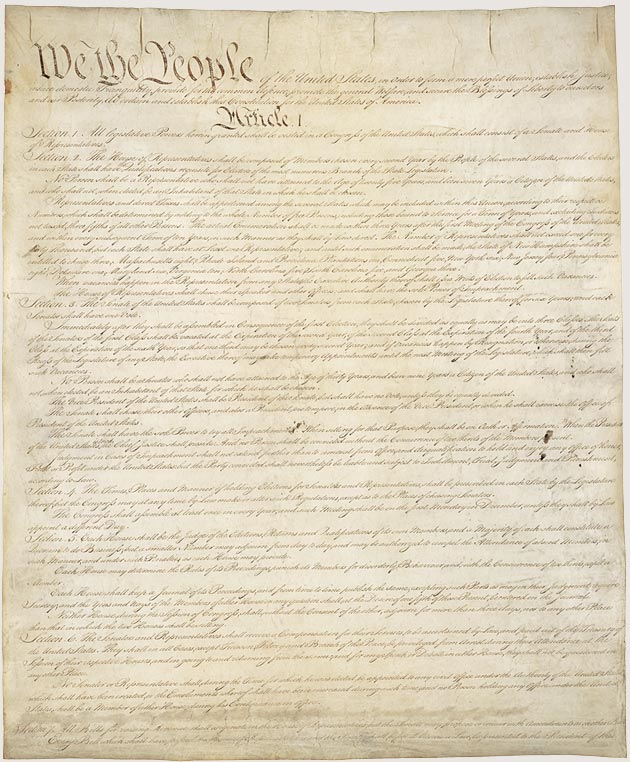8/18/15: Before leaving for recess, the House and Senate Judiciary Committees passed legislation to curb “patent trolling.” Patent trolls use “weak or poorly granted patents” to file numerous patent infringement lawsuits against American businesses “with the hope of securing a quick payday,” according to patent reform bill sponsors.
In recent years, "there has been an explosion of abusive patent litigation designed not to reward innovation and enforce intellectual property, but to threaten companies in order to extract settlements based on questionable claims," according to the Obama Administration. Such firms are known as Patent Assertion Entities (PAEs) or "patent trolls." And defendants and licensees in these lawsuits paid out $29 billion in 2011, a 400% increase from 2005.

Patents Rooted in the Constitution
Our nation's patent system is designed to encourage innovation and invention—and is rooted in the Constitution:
The Congress shall have Power … To promote the Progress of Science and useful Arts, by securing for limited Times to Authors and Inventors the exclusive Right to their respective Writings and Discoveries.
Patent Bills in Congress
Here’s a look at the two bills passed by the House and Senate Judiciary Committees. However, it is still unclear when these bills will receive a floor vote in either chamber.
PATENT Act (S 1137)
Sponsor: Chuck Grassley (D-IA) “Shifts the legal burden back onto those who would abuse the patent system in order to make a quick buck at the expense of businesses that are playing by the rules,” according to the bill sponsor. “Would establish clear, uniform standards for pleading in patent infringement suits to give defendants real notice of the claims against them, and keep meritless lawsuits from clogging federal court dockets. It also increases transparency by requiring early disclosures about the patent-in-suit. The bill protect customers who are targeted for patent infringement based on a product they simply purchased from a manufacturer or off the shelf by allowing the stay of an infringement case against an end user of a product while the manufacturer of the product litigates the alleged infringement.” (Read bill summary or bill text)
From our Hill Sources: This bill has the support of the Secretary of Commerce Penny Pritzker.
Innovation Act (HR 9)
Sponsor: Bob Goodlatte (R-VA) “The bipartisan Innovation Act (HR 9), which is the same legislation that passed the House in 2013, builds on the reforms that were made in the America Invents Act and addresses certain abusive practices taking place in our courts,” according to the bill sponsors. “Requires plaintiffs to disclose who the owner of a patent is before litigation, so that it is clear who the real parties behind the litigation are. This will ensure that Patent Trolls cannot hide behind a web of shell companies to avoid accountability for bringing frivolous litigation. Requires plaintiffs to actually explain why they are suing a company in their court pleadings.” (Read bill text)
From our Hill Sources: While patent reform has bipartisan support among Members of Congress, important constituencies are divided. Technology companies support these bills. However, the pharmaceutical and biotech industries are opposing the proposals. Meanwhile, research companies only support the Senate bill and not the House bill.
There are two other approaches to patent reform introduced in Congress:
Support Technology and Research for our Nation's Growth Patents Act (“STRONG” Patents Act) (S 632)
Sponsor: Sen. Chris Coons (D-DE) “Would make it harder for firms to be targeted with frivolous patent lawsuits, level the playing field between small inventors and large companies, and ensure the U.S. Patent and Trademark Office has the resources it needs to ensure patent quality,” according to bill sponsors. The STRONG Patents Act would strengthen our patent system and combat abuse by: Cracking down on abusive demand letters by empowering the Federal Trade Commission to target firms that abuse startups rather than invent anything; Ensuring that pleading standards for patent-infringement cases match the standards used for all other forms of civil actions, creating a significant barrier to frivolous lawsuits before any funds are spent on discovery. (Read bill summary or bill text)
Targeting Rogue and Opaque Letters (TROL) Act (HR 2045)
Sponsor: Micheal Bergess (R-TX) “Establishes that it is an unfair or deceptive act or practice under the FTC Act to engage in a pattern or practice of sending demand letters that contain misrepresentations about patent rights and allows the FTC and State AGs to fine violators acting with reckless indifference. Requires that demand letters include key information, such as the person with the rights of the patent, parent companies, contact information, and information on how the recipient is infringing the patent. This will help businesses weed out legitimate from deceptive demand letters. Establishes a national standard for enforcement of abusive patent demand letters. Preserves all of the FTC’s existing powers and enforcement authority and current state laws dealing with fraudulent or deceptive practices.” (Source: House Energy and Commerce Committee) (Read bill text)
— Please keep in mind that highlighting a bill doesn't imply a POPVOX endorsement in any way. Rather, we're simply trying to offer one more way to stay informed of a complex legislative system. —